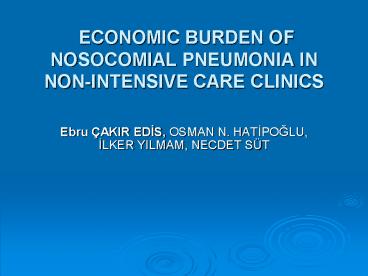ECONOMIC BURDEN OF NOSOCOMIAL PNEUMONIA IN NON-INTENSIVE CARE CLINICS
1 / 13
Title:
ECONOMIC BURDEN OF NOSOCOMIAL PNEUMONIA IN NON-INTENSIVE CARE CLINICS
Description:
MaterialsandMethod- ControlGroup. This was designed as a case-control study. To establish a control group, age-, sex- and diagnosis- matched patients who were ... –
Number of Views:0
Avg rating:3.0/5.0
Title: ECONOMIC BURDEN OF NOSOCOMIAL PNEUMONIA IN NON-INTENSIVE CARE CLINICS
1
ECONOMIC BURDEN OF NOSOCOMIAL PNEUMONIA
IN NON-INTENSIVE CARE CLINICS
- Ebru ÇAKIR EDIS, OSMAN N. HATIPOGLU, ILKER
YILMAM, NECDET SÜT
2
Objectives
- Almost all studies on the cost of NP include
ventilator-associated pneumonia (VAP) - The studies on NP in non-intensive care clinics
are very limited and only include specific groups
of patients - This study aims to determine the economic burden
of NP on developed clinics of the hospital.
3
Materials and Method- Patients
- Data on costs of the 154 adult patients (97 male,
57 female mean age 64.5314.92) who were
hospitalized in non-intensive care clinics
between March 2005 and February 2006 and
developed NP were recorded prospectively. - Immunosuppressed patients who developed pneumonia
and cases with NP in intensive care units were
excluded.
4
Materials and Method- Control Group
- This was designed as a case-control study. To
establish a control group, age-, sex- and
diagnosis- matched patients who were hospitalized
on the same dates were listed using the hospital
automation program - The list was reviewed, and those patients who
had not developed pneumonia were included in the
control group.
5
Materials and Method-Study protocol
- Patients with NP and control patients were
followed-up until death or discharge from the
hospital. - Data on costs were obtained from the hospital
automation program - The costs in Turkish lira were converted to US
dollars based on the Central Bank of the Turkish
Republics US dollar exchange rates on the day of
discharge from the hospital
6
Materials and Method-Costs 1
- Costs for both groups
- Hospital bed and caregiver costs
- Microbiological test costs
- Radiology costs
- Laboratory costs
- Consultation costs
7
Materials and Method-Costs 2
- Costs of antibiotics used for non-pneumonia
conditions - Non-antibiotic treatment costs
- Total costs
- In addition, the costs of antibiotics used to
treat pneumonia in NP patients were calculated.
8
ResultsTable 1. Patient characteristics
- Patients Controls p
- (n154) (n148)
- Age (meanSD) 64.5314.92 65.6613.86
0.49 - Gender (M) 97(63) 94(63.5)
0.92 - Days of hospitalization
- MeanSD 32.8527.33
9.857.08 lt0.0001 - Median 25(3-150)
9(1-49)
9
Table 2. Diagnosis at hospitalization for
patient and control groups
Diagnoses Patients (n154) Control(n148)
Cerebrovascular dis. 58 58
Trauma 13 13
Lung cancer 7 7
Subarachnoidal hemorrhage 7 7
Cardiac failure 6 6
Acute myocardial ischemia 6 6
Chronic renal failure 4 4
Peripheral artery disease 3 3
Peptic ulcer 3 2
Intracranial mass 3 3
Laryngeal cancer 3 3
Colon tumor 3 3
Chronic obstructive lung dis. 3 3
Others 35 30
10
Table 3. Comparison of costs in NP patients and
control cases
Mean() Std. Dev.() p
Hospitalization NP 631.11 610.143 lt0.0001
Hospitalization Control 153.45 190.361
Caregiver NP 117.27 131.110 lt0.0001
Caregiver Control 46.21 44.766
Non-pneumonia antibiotics NP 434.63 633.272 0.11
Non-pneumonia antibiotics Control 212.90 237.311
Non-antibiotic therapy NP 2789.32 3714.121 lt0.0001
Non-antibiotic therapy Control 543.39 753.630
Microbiology NP 310.00 266.078 lt0.0001
Microbiology Control 84.30 60.840
Radiology NP 269.29 215.180 lt0.0001
Radiology Control 152.94 149.872
Laboratory NP 729.68 666.693 lt0.0001
Laboratory Control 187.27 135.068
Consultation NP 63.42 81.179 lt0.0001
Consultation Control 29.98 42.907
Total costs NP 6240.95 6041.499 lt0.0001
Total costs Control 1117.26 1028.900
11
Discussion-I
- In a study analyzing the economic burden of NP on
the insurance system, the cost of one episode was
calculated at 5800 - That study, including 33 patients with NP and 11
control cases - Moreover, the data in that study were obtained
exclusively from the health insurance database.
12
Discussion-II
- The studies on NP costs only include specific
groups of patients (intraabdominal and head and
neck surgery) - This study was a large-scale study assessing all
patients with NP in 23 departments, including all
internal medicine and surgery clinics except
intensive care and pediatrics in a university
hospital.
13
Discussion-III
- In conclusion, NP is a high-cost disease that
increases the duration of hospitalization
3.5-fold, hospital-bed cost 4-fold, and total
cost 5.5-fold. All of the increasing cost not
only explain to NP but it is important part of
the economic burden. - It is essential to take measures for the
prevention of NP considering its high cost.































